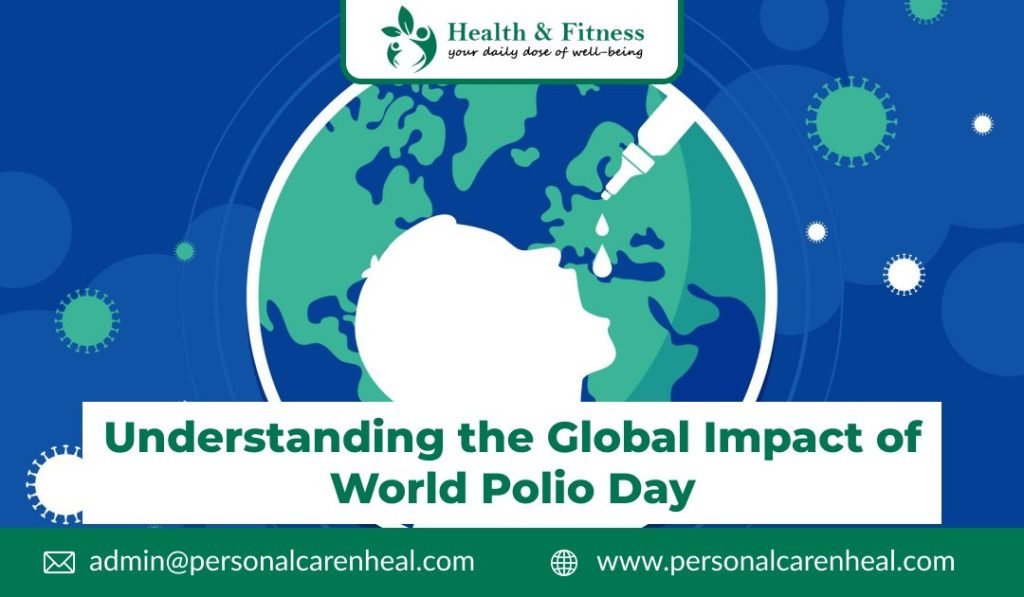Every year, 24 October is observed as World Polio Day to spread awareness of the importance of polio vaccination to save every child from polio disease. On this day, several local, national, and international healthcare organizations, including the Centres of Disease Control and Prevention (CDC), World Health Organization (WHO) and Rotary International, Bill & Melinda Gates Foundation and Gavi, the United Nations Children’s Fund (UNICEF), the vaccine alliance come together and organize various events, vaccinations, campaigns, and educational programs to spread awareness regarding the significance of offering vaccines to children to prevent polio.
What is Polio?
Polio is a disease that can be a result of poliovirus. It causes mild or no signs in most people, but in some people, it can result in paralysis or death. The poliovirus has three variations, called wild poliovirus types 1, 2, and 3. Wild polio types 2 and 3 no longer exist and wild polio type 1 only exists in a few parts. WPV1 intends to cause paralysis.
Abortive Poliomyelitis Symptoms
fever
sore throat
vomiting
headache
fatigue
constipation
Non-Paralytic Poliomyelitis Symptoms
severe headache
sensitivity to light
feeling of needles in your arms and legs
neck stiffness
Paralytic Poliomyelitis Symptoms
muscle spasms
sensitivity to touch
Polioencephalitis Symptoms
seizures
anxiety
trouble focusing
extreme tiredness
Why is World Polio Day Celebrated?
Polio is also known as poliomyelitis, which is a highly viral infectious disease, primarily impacting children under 5. The virus can be spread from one person to another, primarily through the faecal-oral pathway, or by sharing objects (such as contaminated water or food). It multiplies in the intestine, from where it can enter the nervous system and result in paralysis.
Because of a loss of viral attenuation in the oral polio vaccine, there are cases of paralytic poliomyelitis, also known as vaccine-associated paralytic poliovirus (VAPP). VAPP is extremely rare, occurring around 3.8 times per lakhs of cases in nations using the oral poliovirus vaccine.
Over the past 35 years, wild poliovirus cases have decreased by over 99%, from 3,50,000 cases per year to less than 10 cases annually of wild polio. Only 4 subnational regions have been identified with 80% of variant polio cases.
Polio is a contagious disease impacted by the polio virus. Although extremely rare, the virus may affect the brain parts which can result in fatality. World Polio Day was established to eliminate polio globally and to ensure a polio-free future for everyone, develop high-quality observation to identify any presence of the virus, implement high immunization coverage, and plan ahead for an outbreak response.
History of World Polio Day
World Polio Day was celebrated by Rotary International to celebrate the birthday of Jonas Salk, the medical researcher who guided the first team to develop a polio vaccine. In 1955, he made the inactivated poliovirus vaccine. In 1962, Albert Sabin made the oral polio vaccine. In 1988, the World Health Assembly committed to eliminate the poliovirus, at the time, there were nearly 3,50,000 cases globally. In 2002, the WHO European Region was announced polio-free since then on 24 October, World Polio Day has been globally celebrated.
How does Polio Spread?
Polio is highly contagious and it can spread by:
Not washing hands after touching poop, like changing diapers or after going to the bathroom.
Eating foods that came in touch with contaminated water.
Swimming in polluted water. Water can become polluted when someone with diarrhoea swims in it.
Getting in touch with someone affected by polio.
Touching infected surfaces.
Can Polio be Cured?
No, polio can’t be cured but it can be prevented. There is not any way to get rid of it faster or prevent paralysis.
How to Prevent Polio?
Polio can be prevented by getting vaccinated. Polio vaccination can be done during childhood.
Conclusion
The blog covers essential aspects of polio. Make sure to get your child vaccinated at the right time to prevent polio. It is also important to spread awareness about polio to save others too. Moreover, keep yourself updated with such informative and knowledgeable blogs by subscribing to Personal Care N Heal.



